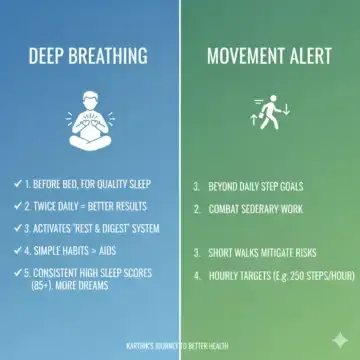Home-cooked meals are also essential, and considering factors like stress management, sleep, and nutrition are equally vital for overall well-being.
In an October 15 piece he wrote for The Times of India, Bengaluru, Karthik Srinivasan, a communications professional, highlighted these as he shared his fitness journey and the lessons he learned after undergoing angioplasty and getting two stents. Despite running 5 km every day, sleeping on time, avoiding unhealthy food and following a healthy lifestyle, Karthik experienced chest discomfort, which led to the discovery of two blockages in his arteries.
Even with healthy lifestyle, unexpected health issues can arise
Karthik's story highlights that even with a healthy lifestyle, underlying heart issues can arise, and it's essential to be proactive about our health. He narrated his health journey from 2011 to 2015, sharing he went from 'discomfort in the chest, angiogram, no blocks and all clear' to 'discomfort in the chest while running at a higher speed, angiogram, two blocks, angioplasty and two stents'.
Karthik wrote that he was puzzled after the angioplasty: "'Why me?' I have been running 5 km regularly (almost 290-300 days every year). I sleep predictably early and on time. I am generally careful about what I consume. I do not smoke. As far as I know, I have no family history of heart conditions. I have experienced limited stress on a day-to-day basis since 2018, when I started working from home, on my own, as an independent communications professional."
Expressing his gratitude for not having a heart attack and his daily running habit 'leading to the need for an angiogram without any emergency', Karthik shared how his routine has changed after his 'second chance at life'. He said, "I have started doing everything better. I have started running gradually again, daily. I have become even more conscious about what I consume. This includes drastically cutting down on food from outside. I now firmly believe that food from outside is not a luxury. Home-cooked food is the real luxury. I do eat out and order food from outside, but that is on specific 'cheat days' only. Not on a whim. I have also completely eliminated ultra-processed (most packaged) foods from my diet."

Karthik went on to share two things that have made a 'dramatic impact' in his life, which he had not considered prior to his angioplasty:
Deep breathing
Karthik shared that despite his 'predictable and early sleeping habits', he had always struggled with the quality of his sleep. Here's what he has learnt:
1. Deep breathing exercises, especially before bedtime, can significantly improve sleep quality.
2. Consistency is key; practicing deep breathing twice daily yields better results.
3. The parasympathetic nervous system plays a crucial role in sleep quality, and deep breathing can "pre-load" it to reduce stress and promote better sleep.
4. Simple, consistent habits can have a more significant impact on sleep quality than relying on various sleep aids or accessories.
5. By incorporating deep breathing exercises into his daily routine, Karthik shared he achieved consistently high sleep scores (85+), increased frequency of dreams (REM sleep), and woke up feeling refreshed.
Movement alert
Karthik, who was already 'hitting 8,000/10,000 steps a day', shared that he now aims to reduce his risk of heart issues and adopt a more balanced lifestyle. Here are some his learnings:
1. Regular movement throughout the day is crucial, beyond just daily step goals.
2. Sedentary work habits can negate the benefits of regular exercise.
3. Taking movement alerts seriously and incorporating short walks can help mitigate the risks of a sedentary lifestyle.
4. Setting specific, hourly movement targets (example: 250 steps/hour) can be an effective way to stay active.

 Karthik went on to share two things that have made a 'dramatic impact' in his life, which he had not considered prior to his angioplasty:
Deep breathing
Karthik shared that despite his 'predictable and early sleeping habits', he had always struggled with the quality of his sleep. Here's what he has learnt:
1. Deep breathing exercises, especially before bedtime, can significantly improve sleep quality.
2. Consistency is key; practicing deep breathing twice daily yields better results.
3. The parasympathetic nervous system plays a crucial role in sleep quality, and deep breathing can "pre-load" it to reduce stress and promote better sleep.
4. Simple, consistent habits can have a more significant impact on sleep quality than relying on various sleep aids or accessories.
5. By incorporating deep breathing exercises into his daily routine, Karthik shared he achieved consistently high sleep scores (85+), increased frequency of dreams (REM sleep), and woke up feeling refreshed.
Movement alert
Karthik, who was already 'hitting 8,000/10,000 steps a day', shared that he now aims to reduce his risk of heart issues and adopt a more balanced lifestyle. Here are some his learnings:
1. Regular movement throughout the day is crucial, beyond just daily step goals.
2. Sedentary work habits can negate the benefits of regular exercise.
3. Taking movement alerts seriously and incorporating short walks can help mitigate the risks of a sedentary lifestyle.
4. Setting specific, hourly movement targets (example: 250 steps/hour) can be an effective way to stay active.
Karthik went on to share two things that have made a 'dramatic impact' in his life, which he had not considered prior to his angioplasty:
Deep breathing
Karthik shared that despite his 'predictable and early sleeping habits', he had always struggled with the quality of his sleep. Here's what he has learnt:
1. Deep breathing exercises, especially before bedtime, can significantly improve sleep quality.
2. Consistency is key; practicing deep breathing twice daily yields better results.
3. The parasympathetic nervous system plays a crucial role in sleep quality, and deep breathing can "pre-load" it to reduce stress and promote better sleep.
4. Simple, consistent habits can have a more significant impact on sleep quality than relying on various sleep aids or accessories.
5. By incorporating deep breathing exercises into his daily routine, Karthik shared he achieved consistently high sleep scores (85+), increased frequency of dreams (REM sleep), and woke up feeling refreshed.
Movement alert
Karthik, who was already 'hitting 8,000/10,000 steps a day', shared that he now aims to reduce his risk of heart issues and adopt a more balanced lifestyle. Here are some his learnings:
1. Regular movement throughout the day is crucial, beyond just daily step goals.
2. Sedentary work habits can negate the benefits of regular exercise.
3. Taking movement alerts seriously and incorporating short walks can help mitigate the risks of a sedentary lifestyle.
4. Setting specific, hourly movement targets (example: 250 steps/hour) can be an effective way to stay active.